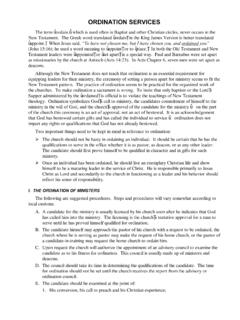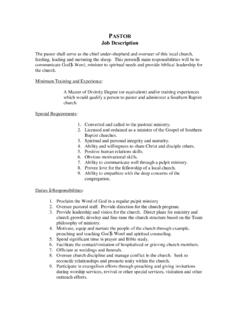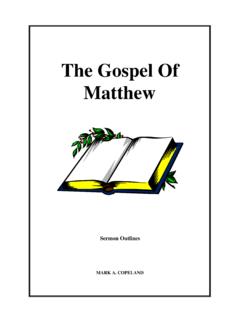Transcription of HOW TO WRITE A CHURCH HISTORY
1 HOW TO WRITE A. CHURCH . HISTORY . By Eli H. Sheldon The goal of the Historical Commission of Oklahoma Baptists is both to preserve our HISTORY and aid churches in realizing the historical significance of their work in evangelism and missions. and to encourage them to continue their faithful service. Learn more about the Historical Commission and it's work at This book is produced by the Gaskin Baptist Archives of the Baptist General Convention of Oklahoma. It is presented in conjunction with the Oklahoma Baptist Historical Commission and the Oklahoma Baptist Historical Society. All writings and materials (unless otherwise noted) are provided by the author, Eli Sheldon, and may not reflect the opinions of the Oklahoma Baptist Historical Commission and Historical Society, nor the Baptist General Convention of Oklahoma. In addition, no materials or opinions are expressed by the author that are known to be, or intended to be, contrary to the positions of the BGCO or any of its authorized entities.
2 March 10, 2010. Gaskin Baptist Archives Baptist General Convention of Oklahoma 3800 N. May Avenue Oklahoma City, OK 73112. Preface While I have attempted to provide a readable text, please observe that items in bold print, such as these five words, will indicate especially important materials that need special attention. The overall theme of this writing might be to do your best, make it a finished work, and always consider what needs to be included that will cause anyone to want to read what you wrote. I have chosen to use a more informal style of writing by saying I have , rather than This writer has within the text. If you desire a formal setting, wear a bow tie or Sunday dress while reading this material. I am greatly indebted to my beautiful wife Freida, who serves as my Ministry Assistant at the Gaskin Baptist Archives, of the Baptist General Convention of Oklahoma, and attempts to keep me within the limits of fairly normal behavior.
3 Her expertise with computers, use of grammar, and cooking, have allowed me to complete this writing. I'll still take the blame for any errors. I am also indebted to Dr. J. M. Gaskin and others who have provided a vast amount of research materials for this project. Eli H. Sheldon CONTENTS. Chapter Title Page Chapter I Why Are You Writing a CHURCH HISTORY ? 4. Chapter II How to Gather Materials for Writing 6. Chapter III How to Gather Oral Histories 11. Chapter IV How to WRITE Effectively 14. Chapter V How to Use Your English Skills Properly 18. Chapter VI How to Format Your CHURCH HISTORY 22. Chapter VII The Gaskin CHURCH HISTORY Award 26. Bibliography 28. Chapter I. WHY ARE YOU WRITING A CHURCH HISTORY ? The first question one must consider is just why do you desire to WRITE this HISTORY ? Quite often a major anniversary is approaching and this causes people to begin talking of the need for a CHURCH HISTORY .
4 Occasionally an older member will realize the CHURCH has no written record of the past (other than some membership records and minutes), and thus, sees the need for such a document. Whatever the reason for writing, a CHURCH HISTORY is extremely important. CHURCH histories reveal the hearts and lives of those who first established the CHURCH . A CHURCH HISTORY is the record of the faith of our forefathers. It is a living record of the triumphs, trials, and tribulations that teach us how they solved conflicts of the past, and how to deal with future similar situations. It is a story of our parents and grandparents, and often reveals previously unknown insights into their personalities, habits, and spiritual desires. One of the most fascinating blessings is when a CHURCH member says, I didn't know that about my grandparents. I wish I had known them better. They were really wonderful people.
5 In other cases, unusual information is revealed. One lady recently discovered that her long deceased grandmother, who was a saintly CHURCH member in her older age, was the wife of a well-known mobster in the 1930's. She remembered her grandmother as a kind, Bible reading person. Grandma had changed her name, and only by extensive research was the truth made known. It's amazing what research will reveal. Incidentally, that note about Grandma didn't make the CHURCH HISTORY book. Occasionally HISTORY of the community can be discovered by reading the old CHURCH minutes. This writer has experienced various CHURCH records from the 1920's and 1930's telling of why a CHURCH helped the community fund the local youth center, plan a airport, build neighborhood tennis courts, fight against political corruption, stand against evolution, and aid the local authorities in cleaning up speakeasies. Other CHURCH records (during the 1940's and 50's) have provided communities with lists of those in the military service (especially during WW II), war time rationing standards, community services, air raid shelters, and many other long forgotten aspects of live during that era.
6 One CHURCH helped their small town discover where legal agreements were located regarding public property. The records had been destroyed in a courthouse fire, but the CHURCH had recorded the events in their 1930's minutes and the location of other copies of the court documents. The second logic question regarding the CHURCH HISTORY is who is going to WRITE this HISTORY ? One who desires to paint pictures may never be regarded as a painter. One who prepares meals may never be a good cook. Likewise, not everyone who desires the WRITE will be a good writer. The CHURCH must take care in who is selected to WRITE and produce the CHURCH HISTORY . The writer must first have the desire to take on such a task. While others might supply some information and records might be available, there is a tremendous amount of time and skill needed to produce a good writing. The one basic question to be asked by every writer is: Why would anyone want to read this writing?
7 Much more will be said about this later, but basically speaking, most folk just don't sit around reading a CHURCH HISTORY unless there are unique elements that compel a reader to continue. I have often advised folk to use a lot of pictures in their CHURCH HISTORY , because that's the only part about three-fourths of the people will ever see. Even now, this writer is questioning why anyone would have read this portion of this chapter so far. The point is, make the writing readable and user friendly. The writer must have a very good working knowledge of grammar and syntax, and the ability to use human interest stories. Facts might build a basic skeleton, but human interest stories put flesh on the structure. Again, this writer praises the Lord every time he realizes what modern computers can do for a rather plain writing. Speling, grammer, an sin tax isn't won of my best trates. Praise the Lord for spell check and grammar notes.
8 The CHURCH HISTORY writer is representing the quality of the past and the image of the CHURCH , and must reflect that in the writing. The writer must never take on the job assuming there will be great recognition for the work. While some will applaud the effort, others will be quick to point out what the writer left out or reported wrongly. Unfortunately, those critics (if they are really right) didn't share the information they had prior to the writing. The CHURCH must assume that a good HISTORY will be costly to produce. A simple bulletin sized synopsis, or three page 8 by 11 HISTORY , may be easily reproduced, but will never be the adequate record that is needed to reflect the true CHURCH HISTORY . A. later portion of this book will give details on the various formats of an extensive document. Why are you writing a CHURCH HISTORY ? It is because a HISTORY is needed. It will bridge the gap from the past to the future for the CHURCH .
9 In most cases, it should have been done years ago. This writer hopes you enjoy the journey through this book as we explore how to get this matter done properly. So sit back, relax, and sail with us from the shores of the present to the depths of the past, and back again. Let's journey together through the years of time and see what great mysteries, marvels, and spiritual motivations compelled our forefathers to invest in this thing we call our CHURCH . 5. Chapter II. HOW TO GATHER MATERIALS FOR WRITING. When searching for treasures or clues to a deep mystery, we are told to make sure all stones are overturned. The idea is to look everywhere for the gems that will make the search more productive. The more we find, the better the results. In writing, the same principle applies. The more you research, the more you will find materials for the CHURCH story. The big problem is: Where will one find the information about which to WRITE ?
10 In addition, when are we finished searching? While the places to find information will vary, we never really finish researching. The best we can do is to go until we don't think we can go anymore. Researching and writing a CHURCH HISTORY is like reading the Bible. The more you do, the more you realize you need to keep doing. To begin this journey into gathering the gems of time, let's find some very suspicious stones to look under. THE LOCAL CHURCH . The most logical place to start with gathering a CHURCH HISTORY is at your local CHURCH . You might begin with legal papers. Most churches have a CHURCH covenant which will give the writer a sense of what the CHURCH was trying to accomplish in its formation. Unfortunately, most CHURCH covenants are merely restatements of the standard CHURCH covenant developed and published by early Baptists as part of the Philadelphia Confession of Faith (1742).





